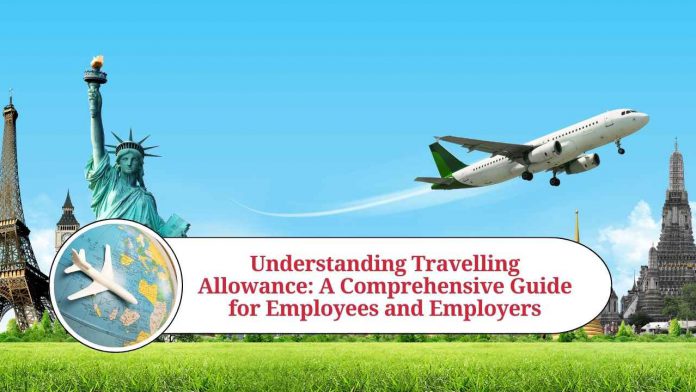Travelling Allowance: All You Need to Know
Travelling for work is a common practice in many companies. Whether it’s meeting clients, attending conferences or training sessions, employees often have to travel for official purposes. To compensate for the expenses incurred during such travels, companies provide their employees with a travelling allowance. In this blog, we will take a closer look at what travelling allowance is, how it works, and its benefits.
What is Travelling Allowance?
Travelling allowance (TA) is a payment made to employees by the company to compensate for the expenses incurred during official travels. The allowance usually covers expenses such as transportation, lodging, and meals. The amount of TA varies depending on the company’s policies and the nature of the trip. Some companies may have a fixed rate for TA, while others may provide reimbursement based on actual expenses.
Types of Travelling Allowance
There are two types of travelling allowance: fixed and variable.
Fixed Travelling Allowance: Under this type of TA, the company pays a fixed amount to the employee for each day of travel. This amount is predetermined and does not depend on the actual expenses incurred by the employee.
Variable Travelling Allowance: In this type of TA, the company reimburses the employee for the actual expenses incurred during the travel. The employee is required to submit bills and receipts for the expenses to claim reimbursement.
Benefits of Travelling Allowance
Travelling allowance has several benefits for both the company and the employee.
For the Company:
- It helps attract and retain employees: By providing a TA, the company shows that it values its employees and is willing to compensate them for their efforts.
- It helps improve employee productivity: When employees don’t have to worry about the expenses incurred during travel, they can focus on their work, leading to better productivity.
- It helps in compliance: Companies need to comply with tax laws and regulations. By providing a TA, the company can claim tax benefits and reduce the tax liability.
For the Employee:
- It helps reduce financial burden: Travelling can be expensive, and employees may have to spend money from their pockets. TA helps reduce the financial burden and ensures that employees are not out of pocket for work-related travel.
- It motivates employees: When employees feel that their efforts are appreciated, they are motivated to work harder and perform better.
- It helps in tax savings: Employees can claim tax benefits on the TA received, reducing their tax liability.
Travelling allowance is an important component of an employee’s salary package. It is a way for companies to compensate their employees for the expenses incurred during official travel. The allowance helps in reducing the financial burden on employees and ensures that they are not out of pocket for work-related travel.
However, it is essential to note that travelling allowance policies differ from company to company. Some companies may have a fixed rate for TA, while others may provide reimbursement based on actual expenses. It is important for employees to understand their company’s TA policy and follow the guidelines for claiming reimbursement.
Employees are required to keep a record of their travel expenses, such as transportation, lodging, and meals. They must submit the bills and receipts for the expenses to the finance department to claim reimbursement. Failure to provide proper documentation may result in the rejection of the reimbursement claim.
It is also essential for companies to have a clear TA policy that outlines the expenses covered, the reimbursement process, and the maximum limit for TA. This helps in avoiding any confusion or misunderstandings between the company and its employees.
Conclusion
In conclusion, travelling allowance is an important benefit that companies provide to their employees who travel for work. It helps in reducing the financial burden on employees and ensures that they are compensated for their efforts. It is important for both the company and the employee to understand the TA policy and follow the guidelines for claiming reimbursement to avoid any disputes.
Read more useful content:
Frequently Asked Questions (FAQs)
What is a travelling allowance?
A travelling allowance is a payment made by a company to its employees to compensate for the expenses incurred during official travels.
What expenses are covered under a travelling allowance?
A travelling allowance usually covers expenses such as transportation, lodging, and meals.
Is the travelling allowance taxable?
The travelling allowance is taxable in the hands of the employee. However, certain exemptions and deductions can be claimed.
What is the difference between a fixed and variable travelling allowance?
Under a fixed travelling allowance, the company pays a fixed amount for each day of travel. Under a variable travelling allowance, the company reimburses the employee for the actual expenses incurred during the travel.
What is the maximum limit for travelling allowance?
The maximum limit for travelling allowance varies from company to company. It is usually based on the nature of the trip and the company’s policies.
Can an employee claim reimbursement for personal expenses incurred during official travel?
No, an employee can only claim reimbursement for expenses that are directly related to official travel.
What is the process for claiming reimbursement for the travelling allowance?
The employee must submit bills and receipts for the expenses incurred during travel to the finance department to claim reimbursement.
Can an employee claim reimbursement for international travel expenses?
Yes, employees can claim reimbursement for international travel expenses if it is a part of their official duties.
Is it mandatory for companies to provide travelling allowance to their employees?
No, it is not mandatory for companies to provide travelling allowance to their employees. It is at the discretion of the company to provide this benefit.
Can an employee claim reimbursement for cancelled trips?
It depends on the company’s policy. Some companies may allow employees to claim reimbursement for cancelled trips, while others may not. It is important for employees to understand their company’s policy on this matter.




















